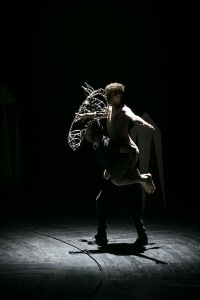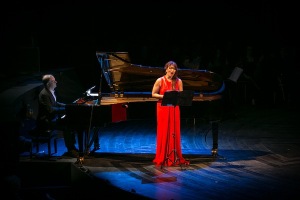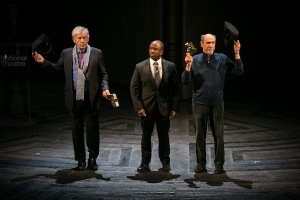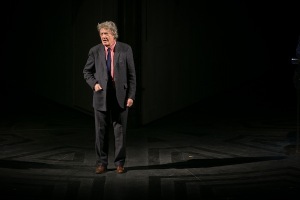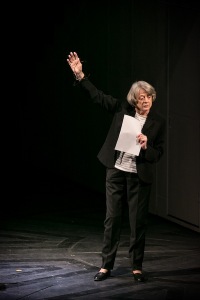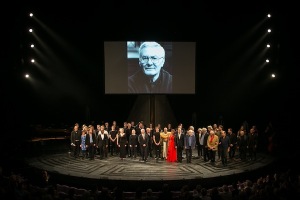Peter Shaffer: An immortal life
by Mika Provata-CarloneOur lives, our intellectual and emotional worlds, our humanity and imagination, owe a great, indelible debt to Peter Shaffer, for revealing to us the wonder and the dark mystery of our existence, for enhancing so starkly and so gently our knowledge of ourselves, of our history and society, its ethics, aspirations, the sheer mechanics and intangible immanence of all that we are.
Shaffer could be said to have left us surprised by joy, a very sacred, sometimes awe-filled kind of joy, with everything he did: from the delicious, mischievous frivolity of his comedies, which contained all the fragility of our yearnings and desires, to the sparkling wit of his detective fiction, co-authored with his twin brother Anthony under the pseudonym ‘Peter Antony’, and yet still to the arresting (often devastating) power of his dramas, which brought us face to face with questions most of us would rather not tackle, with hidden hues and shades in our souls we so meticulously try to conceal, bury under theoretical jargon and historical excuses. Shaffer invariably called upon our vital need to think, to feel, to know, to create and to live.
What made him unique on the contemporary stage was his talent for kindness, for a sharpness of intellect and of perception that was inextricable from an inexhaustible capacity for warmth, generosity and understanding. Also his startling gift for theatrical enchantment, for conjuring gripping worlds of meaning, images, echoes, lives full of pulse and urgency. For extracting the innermost kernels of vital significance, and for presenting us with these veritable offerings of wisdom with such eloquent simplicity and directness, with an unfailing trust in the essential humanity of the human enterprise.
All photographs from the Peter Shaffer Memorial Gala © Cameron Slater
Click on any image to enlarge and view in slideshow
Shaffer was one of those rare playwrights who saw the theatre in its original, Aristotelian, form: a place not only to see and to be seen, but the very space where a certain vision of life, of existence in its most material and most transcendental sense, was possible: as the home of revelation, empathy and the restoration of a very fecund pureness. Highly inventive in his productions (it seems that his stage direction for The Royal Hunt of the Sun, “they climb the Andes”, caused much consternation as well as infinite thrill), Shaffer never resorted to mere theatricality, to ‘atmosphere’, or device. He was as much a craftsman of his art as he was ineffably intuitive, endlessly creative, constantly engaged with every fibre of his characters, every aspect of the worlds he summoned on the stage. Actors, in his hands, became makers of human substance, forgers of a particular ethos, the reverberations of very real lives – past, as well as still to come.
It was an event of tremendous emotional power and the most irresistible immediacy, genuineness and genius. An unreservedly jubilant celebration of Peter Shaffer as a person, as a dramatist, as a friend and colleague.”
When Shaffer died in June 2016, there was a sense of an ending unfulfilled – his was a spirit, a mind, a voice that cannot just simply leave this world, we will not be detached from him, nor can we forget him. His presence is still very much real and his resonance, his significance, is perhaps one of the few compasses of reason, vision and humanity still left to us. Remembrance, however, is not an easy undertaking in the whirlwind we call our contemporary reality. The surfeit and transience of moments and experiences can leave us breathlessly empty and at the same time clogged and incapable of emotion, bereft of a space of stillness where madness stops and voices, feelings, the gestures and the unspoken mysteries of our lives can come together. On 30 March, the Olivier stage of the National Theatre became such a space of great beauty, vibrant stillness, and a particularly magical convergence of memory and life.
The Memorial Gala in honour of Sir Peter Shaffer was an event of tremendous emotional power and the most irresistible immediacy, genuineness and genius. An unreservedly jubilant celebration of Peter Shaffer as a person, as a dramatist, as a friend and colleague, this was an event of rare humanity and brilliance, as well as an incredible feat – bringing together with uncanny incandescence a ‘real and electronic’ chorus of voices of fantastic magnitude to support that most crucial voice, Shaffer’s own. One suspects that the conspiratorial phase of preparation must have been every bit as thrillingly bewitching as the final magic on the stage, involving Shaffer’s agent Rupert Lord, Simon Callow, friend and close collaborator on many of Shaffer’s plays, Hal Cazalet, musician, singer and close friend, who grew up with Shaffer as a cherished guest at his parents’ house, Tim Bradbeer and Charlotte Gorton, who coordinated it all, and Jamie Glover, who directed the event with remarkable virtuosity and very moving panache. Rufus Norris and Lisa Burger offered the Olivier as the space of all that enchantment.
The ‘conceit’ was to summon Shaffer back to the stage so he could give witness to what was undeniably a life touched by immortality, guided by a flair for happiness and informed by a weight of tragedy (or darkness) that was never ignored, but born with wisdom and rare gentleness. Simon Callow became a Mr Verity-style examiner of that life, whereas Michael Pennington incarnated Peter Shaffer with haunting evocativeness – causing a deeply felt sense of double vision, a permeating, spectral presence. Callow’s task was to bring forth before our eyes the “unforgettable… marriage of image, language and gesture” that stood for the work of Shaffer the dramatist, to recall the “magician in the theatre”, and to seek the source of “this bedazzlement” that was Shaffer in every aspect of his being. The plain black semicircle of the Olivier became the space of engrossing incantation, of one apparition after another, as embodied images of the plays that are most branded in theatrical memory came together with the real actors who had first given flesh and voice to these words, gestures, imagined lives that will perhaps never be forgotten.
The Royal Hunt of the Sun, Amadeus and Equus set the perimeters of this extraordinary world, only to be revealed in their relative omnipotence, as Shaffer’s Five Finger Exercise too was dethroned as the ‘first’ play: it all started, we are told by a reluctant Pennington/Shaffer, with a very different play, The Salt Land (1954), which contained most of the themes that would re-emerge, transformed and magnified, time and time again, except one, that of the crucial vitality of Shaffer’s Jewish identity, its mystic depths and very tactile pain. David Horovitch as Jacob and Jonjo O’Neill as Jo created a poignant sketch of sibling rivalry, ethics, the uses and abuses of history, which put the apparent drawing-room comedy of Five Finger Exercise (Lucy Cohu, Jason Merrells, Tom Morley) under its full dramatic light.
Pennington/Shaffer was an irresistible seducer with his storytelling, the richness of his warmth and of experience, the shy delight in a confession that was beguiling, moving, unforgettable. “Most writers start writing because they want to be pitied in public”, we are assured, yet this is a pity of indisputable beauty, a highly enviable “authentic suffering” and “lust for narrative”, or untiring contemplation of “the warped soul”. Callow prods relentlessly, ingeniously, so that we savour, in a rare occasion of delight and intimacy, the cadence and the extraordinary humour, the sharpness of wit and the wholly winning personality of Shaffer, listening to stories of how he “gorged on the theatre age 9”, was a Bevin Boy after Cambridge, how New York felt like “the worst possible city if one was unsure of oneself.” Especially about the challenge of peering deeply into the abyss, of confronting the sense of an “eviscerating nemesis” and feeling the “lacerating power of being demonically possessed” by that all too human darkness and light. We became privy to the thoughts of the dramatist, the experiences of the human individual – small details as well as momentous features of that unique life.
Danielle de Niese’s singing and presence were spellbinding, one of the many larger-than-life figures in this veritable pageant of stars (one can only call them that) on the Olivier stage. Another was Sir Tom Stoppard, standing in for HRH the Prince of Wales, elegiac, with a tactile quality of truth and power, reminding us of Pushkin’s shadow in Amadeus, and especially that the theatre “is an opportunity not to be wasted” – philosophically, aesthetically, dramatically, that it is “the place where big questions have to be asked”, for that is its purpose – a purpose that Shaffer served, fulfilled with a great sense of both beauty and responsibility. For Shaffer, “theatre is the only religion that can never die”, that can provide “faith and true astonishment” of the kind sought in The Gift of the Gorgon. “How do you get your audience to be not only quiet but riveted?” Shaffer wondered. The answer was simple: “Audiences want to be taken prisoner, to surrender whole. They want to rest in the places of the playwright”, that is to say they yearn for sincere and intimate humanity.
This was a mesmerising sequence of moments of magic, seamlessly combined to provide the fabric of Shaffer’s complex, tremendous, and also delicate world: there were several Salieris (Lucian Msamati, Sir Ian McKellen, F. Murray Abraham), the remustering of the forces of The Royal Hunt of the Sun (Christopher Timothy, Oliver Cotton, Sir Derek Jacobi, Sir Michael Gambon), all in a solemn masked procession, and the unification of Jacobi and Maggie Smith for Black Comedy. There was the sheer delight of Maggie Smith as Lettice, the poise of Jacobi as Edward from The Gift of the Gorgon, the naughty deliciousness of Ian McKellen’s tribute. Steven Sondheim crossed the Atlantic thanks to a recorded tribute, his music brought alive with great, feeling clarity by Hal Cazalet, while Daniel Radcliffe bore evidence to Shaffer’s generosity, his gift of always adding what could be most significant to another’s life.
A dark undertone existed too – John Dexter’s tumultuous professional relationship with Shaffer was chillingly embodied by Nicholas Woodeson’s performance, menacing, ominous but also fragile, majestic and deeply human.
Time stopped in the amphitheatre of the Olivier on 30 March, and the stage was transformed into a space where eternity and the single human moment came together with strong emotion, great laughter, a sense of profound awe for a man with eyes full of wonder and a personality of great richness and generosity, a very keen, very human intelligence. Julian Drake at the piano and the Southbank Sinfonia made that stilled time fuse with Shaffer’s current timelessness. The programme that accompanied the event is itself a precious, very personal collection of memories by his niece, friends such as Lady Camilla Cazalet, colleagues, each a distillation of Shaffer and touching proof of his great gift for humanity and outstanding brilliance.
Mika Provata-Carlone is an independent scholar, translator, editor and illustrator, and a contributing editor to Bookanista. She has a doctorate from Princeton University and lives and works in London.

